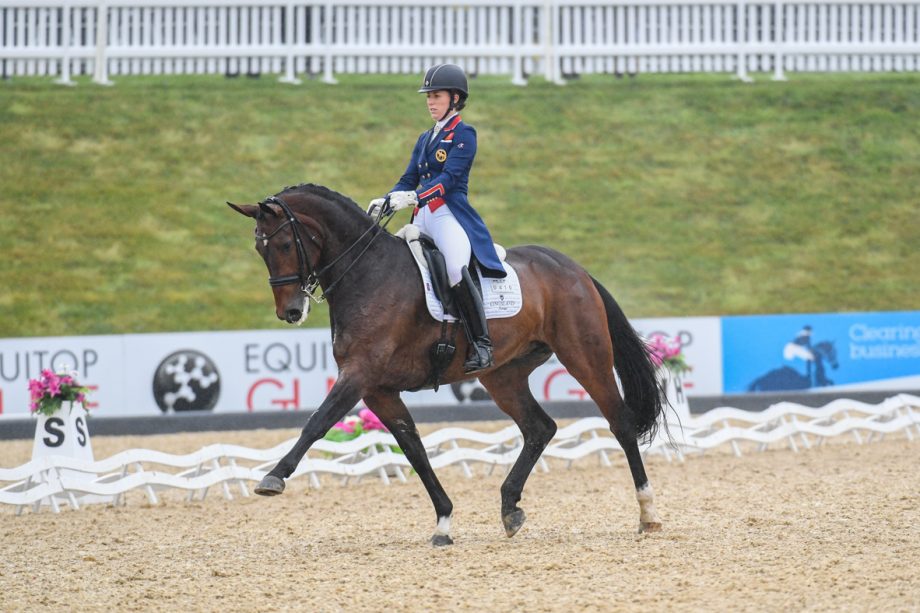In this exclusive interview, double Olympic champion Charlotte Dujardin also chats to Polly Bryan about the highs and lows of 2020, and how her training methods have developed...
For Charlotte Dujardin, 2020 was supposed to be a huge year. She and Mount St John Freestyle were gearing up for the World Cup Final and then the Olympic Games, Charlotte’s first appearance at each since the heady days of Valegro. She entered the year on a high, riding the wave of a euphoric Olympia triumph and keen to put a tough 2019 behind her – her much-publicised elimination under blood rules that lost Britain the silver medal at the European Championships in August 2019 came, somewhat cruelly, at the same time as her 13-year relationship with fiancé Dean Golding was ending.
“It really wasn’t the greatest year in 2019; I found the Euros very tough and going through personal issues at the same time, in splitting up with Dean, felt like a double whammy,” Charlotte says candidly. “I was trying very hard not to allow my personal life to affect my profession and let it show, but it was hard. I felt horrendous about what happened at the Europeans – for Freestyle, for the whole team, for everybody – but I always think that if you don’t win, you learn, and I hope it has made me stronger and a better person.
{"content":"PHA+4oCcT2x5bXBpYSB3YXMgYSByZWFsbHkgZ29vZCBmaW5pc2ggdG8gdGhlIHllYXIgYW5kIEkgcmVtZW1iZXIgbGVhdmluZyB0aGVyZSB3aXRoIG15IGhlYWQgaGVsZCBoaWdoIGFnYWluLCB0aGlua2luZyB0aGF0IDIwMjAgd2FzIGdvaW5nIHRvIGJlIHJlYWxseSBnb29kLuKAnTwvcD4KPHA+QnV0IGxpa2Ugc28gbWFueSwgQ2hhcmxvdHRlIHdhcyB0byBmaW5kIGhlciBkcmVhbXMgdHVtYmxpbmcgb2ZmIGEgY2xpZmY7IHRoZSBwb3N0cG9uZW1lbnQgb2YgdGhlIFRva3lvIE9seW1waWNzIHdhcyB0b3VnaCB0byB0YWtlLiBIb3dldmVyLCB0aGUgc3RyYW5nZSB5ZWFyIGVuZGVkIHVwIGJlaW5nIHBvc2l0aXZlIGZvciBoZXIgaW4gYSB3aG9sZSBob3N0IG9mIHdheXMuPC9wPgo8cD7igJxJdCB3YXMgYW4gYXdmdWwgeWVhciBpbiBzbyBtYW55IHJlc3BlY3RzLCBidXQgSSBoYXZlbuKAmXQgYmVlbiBjb21wbGV0ZWx5IGRldmFzdGF0ZWQsIGJlY2F1c2UgYSB5ZWFyIG9mIHRyYWluaW5nIGhhcyBhY3R1YWxseSBkb25lIG15IGhvcnNlcyBzbyBtdWNoIGdvb2Qs4oCdIGV4cGxhaW5zIENoYXJsb3R0ZSwgYWRkaW5nIHRoYXQgdGhlIGdyYW5kIHByaXggdHJhaW5pbmcgc2hvd3Mgb3JnYW5pc2VkIGJ5IENhcmwgSGVzdGVyIGluIHRoZSBzdW1tZXIgcHJvdmVkIGludmFsdWFibGUuPC9wPgo8cD48ZGl2IGNsYXNzPSJhZC1jb250YWluZXIgYWQtY29udGFpbmVyLS1tb2JpbGUiPjxkaXYgaWQ9InBvc3QtaW5saW5lLTIiIGNsYXNzPSJpcGMtYWR2ZXJ0Ij48L2Rpdj48L2Rpdj48c2VjdGlvbiBpZD0iZW1iZWRfY29kZS0zMSIgY2xhc3M9ImhpZGRlbi1tZCBoaWRkZW4tbGcgcy1jb250YWluZXIgc3RpY2t5LWFuY2hvciBoaWRlLXdpZGdldC10aXRsZSB3aWRnZXRfZW1iZWRfY29kZSBwcmVtaXVtX2lubGluZV8yIj48c2VjdGlvbiBjbGFzcz0icy1jb250YWluZXIgbGlzdGluZy0tc2luZ2xlIGxpc3RpbmctLXNpbmdsZS1zaGFyZXRocm91Z2ggaW1hZ2UtYXNwZWN0LWxhbmRzY2FwZSBkZWZhdWx0IHNoYXJldGhyb3VnaC1hZCBzaGFyZXRocm91Z2gtYWQtaGlkZGVuIj4NCiAgPGRpdiBjbGFzcz0icy1jb250YWluZXJfX2lubmVyIj4NCiAgICA8dWw+DQogICAgICA8bGkgaWQ9Im5hdGl2ZS1jb250ZW50LW1vYmlsZSIgY2xhc3M9Imxpc3RpbmctaXRlbSI+DQogICAgICA8L2xpPg0KICAgIDwvdWw+DQogIDwvZGl2Pg0KPC9zZWN0aW9uPjwvc2VjdGlvbj48L3A+CjxwPuKAnEZyZWVzdHlsZSBoYWQgYSBsb3Qgb2YgcHJlc3N1cmUgb24gaGVyIGVhcmx5IGluIGhlciBjYXJlZXIsIGFuZCBzaGUgd2FzIGdvaW5nIGluIHRoZSBhcmVuYSBhbmQgbm90IHF1aXRlIGdpdmluZyBtZSB3aGF0IHNoZSBkaWQgYXQgaG9tZS4gUGVvcGxlIGNvdWxkbuKAmXQgc2VlIGl0IGJ1dCBzaGUgZ290IG5lcnZvdXMgaW53YXJkbHk7IEkgaGFkIHRvIGdpdmUgaGVyIGNvbmZpZGVuY2UsIGJ1dCBJIHdhcyBwcm9iYWJseSBzdWZmb2NhdGluZyBoZXIgaW4gdHJ5aW5nIHRvIGdvIGZvciBhIDEwIGV2ZXJ5IHRpbWUs4oCdIENoYXJsb3R0ZSBzYXlzIG9mIEVtbWEgQmx1bmRlbGzigJlzIEZpZGVybWFyayBtYXJlLCB3aG8gd29uIHRlYW0gYW5kIGluZGl2aWR1YWwgYnJvbnplIGF0IHRoZSBXb3JsZCBFcXVlc3RyaWFuIEdhbWVzIGluIDIwMTgsIGFnZWQganVzdCBuaW5lLjwvcD4KPHA+4oCcSWYgSSBtYWtlIGEgbWlzdGFrZSBhdCBhIGNvbXBldGl0aW9uLCBwZW9wbGUgd2F0Y2hpbmcgdGhpbmssIOKAmE9oIG15IEdvZCzigJkgYnV0IGF0IHRoZSB0cmFpbmluZyBzaG93cyBJIGRpZG7igJl0IGhhdmUgdG8gYmUgYWZyYWlkIHRvIG1ha2UgbWlzdGFrZXMsIGFuZCBpdCBtZWFudCBJIHdhcyB0aGVuIGFibGUgdG8gY3JlYXRlIG1vcmUgcG93ZXIgYW5kIGV4cHJlc3Npb24gd2l0aG91dCBwdXR0aW5nIHByZXNzdXJlIG9uIEZyZWVzdHlsZS7igJ08L3A+CjxwPkl04oCZcyBwYWlkIG9mZiDigJMgYSBmZXcgZGF5cyBhZnRlciBvdXIgaW50ZXJ2aWV3LCBDaGFybG90dGUgYW5kIEZyZWVzdHlsZSB3ZXJlIGNyb3duZWQgbmF0aW9uYWwgY2hhbXBpb25zLCB3aXRoIGEgd2hvcHBpbmcgOTAuMiUuIEl0IHdhcyB0aGUgZmlyc3QgdGltZSBDaGFybG90dGUgaGFzIGJyb2tlbiBpbnRvIHRoZSA5MHMgd2l0aG91dCBWYWxlZ3JvIOKAkyB0aGUgbGFzdCBvY2Nhc2lvbiBiZWluZyB0aGUgUmlvIE9seW1waWNzIOKAkyBhbmQgaXQgbWVhbnMgQ2hhcmxvdHRlIGNhbiBmaW5hbGx5IHNoYWtlIG9mZiB0aG9zZSB3aG8gZG91YnRlZCBzaGUgY291bGQgcmVwbGljYXRlIGhlciBhY2hpZXZlbWVudHMgd2l0aCDigJxCbHVlYmVycnnigJ0uPC9wPgo8ZGl2IGNsYXNzPSJhZC1jb250YWluZXIgYWQtY29udGFpbmVyLS1tb2JpbGUiPjxkaXYgaWQ9InBvc3QtaW5saW5lLTMiIGNsYXNzPSJpcGMtYWR2ZXJ0Ij48L2Rpdj48L2Rpdj4KPHA+4oCcSXTigJlzIGJlZW4gZ3JlYXQgdG8gYmUgYWJsZSB0byBwcm92ZSB0byBteXNlbGYgYW5kIG90aGVycyB0aGF0LCB3aGlsZSBvZiBjb3Vyc2UgQmx1ZWJlcnJ5IHdhcyBwaGVub21lbmFsLCBpdCBkb2VzIHRha2UgdHdvLiBJIGFjaGlldmVkIHdoYXQgSSBoYXZlIGJlY2F1c2Ugb2YgaGltLCBidXQgSSBzdGlsbCBoYWQgdG8gdHJhaW4gaGltLjwvcD4KPHA+4oCcSSBuZXZlciBkb3VidGVkIG15c2VsZiDigJMgSSBrbmV3IHRoZSBxdWFsaXR5IG9mIGhvcnNlcyBJIGhhZCBjb21pbmcgdXAg4oCTIGJ1dCBpdOKAmXMgaGFyZCB3aGVuIHlvdSBoZWFyIHBlb3BsZSBzYXlpbmcgdGhpbmdzLiBJIHRoaW5rIGl04oCZcyBpbXBvcnRhbnQgZm9yIHBlb3BsZSB0byBzZWUgeW91IGNvbXBldGluZyBob3JzZXMgdXAgdGhyb3VnaCB0aGUgbGV2ZWxzLCBjcmVhdGluZyB0aGUgbmV4dCBhbWF6aW5nIHBhcnRuZXJzaGlwLuKAnTwvcD4KPGRpdiBjbGFzcz0iYWQtY29udGFpbmVyIGFkLWNvbnRhaW5lci0tbW9iaWxlIj48ZGl2IGlkPSJwb3N0LWlubGluZS00IiBjbGFzcz0iaXBjLWFkdmVydCI+PC9kaXY+PC9kaXY+CjxwPlRoYXQgaXMgc29tZXRoaW5nIENoYXJsb3R0ZSBoYXMgZG9uZSBwbGVudHkgb2Ygb3ZlciB0aGUgcGFzdCBmb3VyIHllYXJzLiBTaW5jZSB0aGUgUmlvIE9seW1waWNzLCBzaGUgaGFzIHdvbiBubyBmZXdlciB0aGFuIDMzIG5hdGlvbmFsIHRpdGxlcyB3aXRoIDEyIGRpZmZlcmVudCBob3JzZXMsIGF0IGV2ZXJ5IGxldmVsIGZyb20gbm92aWNlIHRvIGdyYW5kIHByaXguIFdoaWxlIHNoZSBubyBsb25nZXIgY29tcGV0ZXMgYWxsIG9mIHRoZXNlIGhvcnNlcywgdGhlIHlhcmQgc2hlIHNoYXJlcyB3aXRoIENhcmwgSGVzdGVyIGlzIGJyaW1taW5nIHdpdGggZnV0dXJlIG1lZGFsbGlzdHMgdG8gZm9sbG93IFZhbGVncm8gYW5kIEZyZWVzdHlsZS48L3A+CjxwPkhlYWRpbmcgdXAgdGhpcyBjaGFzaW5nIHBhY2sgaXMgR2lvLCBrbm93biBhcyBQdW1wa2luLCB3aG9tIENoYXJsb3R0ZSBzcG90dGVkIHdoaWxlIHRlYWNoaW5nIGEgY2xpbmljIGluIHRoZSBVU0EgaW4gMjAxNi4gU3RhbmRpbmcgYmFyZWx5IDE2aGgsIFB1bXBraW4gbGVhcHQgaW50byB0aGUgaGVhcnRzIG9mIEJyaXRpc2ggZHJlc3NhZ2UgZmFucyBsYXN0IHllYXIsIGFzIGhlIGZvbGxvd2VkIHVwIGEgc3R1bm5pbmcgZ3JhbmQgcHJpeCBkZWJ1dCBpbiBKYW51YXJ5IHdpdGggbW9yZSBwbHVzLTc5JSBwZXJmb3JtYW5jZXMgYXQgdGhlIGxldmVsIGluIHRoZSBhdXR1bW4uIFdpdGggYSBFdXJvcGVhbiBEcmVzc2FnZSBDaGFtcGlvbnNoaXBzIHNldCB0byBydW4gdGhpcyB5ZWFyIGFzIHdlbGwgYXMgdGhlIE9seW1waWNzLCBDaGFybG90dGUgaG9wZXMgdG8gZmllbGQgRnJlZXN0eWxlIG9uIG9uZSB0ZWFtIGFuZCBQdW1wa2luIG9uIHRoZSBvdGhlci48L3A+CjxkaXYgY2xhc3M9ImFkLWNvbnRhaW5lciBhZC1jb250YWluZXItLW1vYmlsZSI+PGRpdiBpZD0icG9zdC1pbmxpbmUtNSIgY2xhc3M9ImlwYy1hZHZlcnQiPjwvZGl2PjwvZGl2Pgo8cD5UaGVuIGNvbWVzIHRoZSBsaWtlcyBvZiBGbG9yZW50aW5hLCBIYXd0aW5zIFNhbiBGbG9yaWFuYSwgUml2ZXIgUmlzZSBJc2FiZWxsYSBhbmQgSW1ob3RlcCwgYW5kIENoYXJsb3R0ZeKAmXMgdm9pY2UgaXMgZnVsbCBvZiBlbnRodXNpYXNtIHdoZW4gZGlzY3Vzc2luZyBldmVyeSBzaW5nbGUgb25lLiBBdCBwcmVzZW50LCBzaGUgaXMgcmlkaW5nIDExIGhvcnNlcyBldmVyeSBkYXkgYW5kIOKAnGl04oCZcyBoYXJkIHRvIGNob29zZSB3aGljaCBvbmUgdG8gcmlkZSBmaXJzdCBhcyB0aGV5IGFyZSBhbGwgc28gZXhjaXRpbmfigJ0uIFdoYXQgYSBwcm9ibGVtIHRvIGhhdmUuPC9wPgo8cD5PbmUgb2YgdGhlIG5ld2VyIG5hbWVzIGlzIHJpc2luZyBzaXgteWVhci1vbGQgQW1wZXJlIG1hcmUgS2lzbWV0LCB3aG9tIENoYXJsb3R0ZSByaWRlcywgYW1vbmcgb3RoZXJzLCBmb3IgUGV0ZXIgQmVsc2hhdy48L3A+CjxwPuKAnFNoZSBpcyBnb2luZyB0byBiZSBhbm90aGVyIEZyZWVzdHlsZSDigJMgc2hl4oCZcyBqdXN0IHBoZW5vbWVuYWwsIGFuZCBJIGNhbuKAmXQgd2FpdCB0byBjb21wZXRlIGhlciB0aGlzIHllYXIgYW5kIGxldCBldmVyeW9uZSBzZWUgaGVyLOKAnSBndXNoZXMgQ2hhcmxvdHRlLjwvcD4KPHA+V2hpbGUgQ2hhcmxvdHRlIGFwcGVhcnMgdG8gaGF2ZSBwZXJmZWN0ZWQgdGhlIGFydCBvZiBob25pbmcgZ3JhbmQgcHJpeCBzdXBlcnN0YXJzLCBzaGUgYXNzdXJlcyBtZSBzaGUgaXMgc3RpbGwgbGVhcm5pbmcgd2l0aCBldmVyeSBob3JzZSBzaGUgdHJhaW5zLjwvcD4KPHA+4oCcT3ZlciB0aGUgeWVhcnMgSSBoYXZlIGJlY29tZSBtb3JlIHBhdGllbnQgaW4gbXkgdHJhaW5pbmcs4oCdIHNoZSBzYXlzLiDigJxTb21lIGhvcnNlcyBjYW4gYW5zd2VyIGEgcXVlc3Rpb24gc3RyYWlnaHQgYXdheSwgYnV0IG90aGVycyBjYW7igJl0LiBJIHVzZWQgdG8gdGhpbmsgaW1tZWRpYXRlbHksIOKAmFdoeSBub3Q\/4oCZIGJ1dCBob3JzZXMgbGlrZSBGcmVlc3R5bGUgYW5kIEZsb3JlbnRpbmEgaGF2ZSB0YXVnaHQgbWUgdGhhdCBzb21ldGltZXMgeW91IHJlYWxseSBqdXN0IGhhdmUgdG8gZ2l2ZSB0aGVtIHRpbWUuPC9wPgo8cD7igJxXaXRoIEZsb3JhIGluIHBhcnRpY3VsYXIsIGl0IGhhcyB0YWtlbiBzbyBtdWNoIHRpbWUgdG8gZ2V0IGhlciBwaHlzaWNhbGx5IHN0cm9uZyBlbm91Z2ggdG8gZG8gZ3JhbmQgcHJpeCzigJ0gc2hlIHNheXMgb2YgdGhlIDExLXllYXItb2xkIFZpdmFsZGkgbWFyZSwgd2hvIHdvbiBldmVyeXRoaW5nIHNoZSBlbnRlcmVkIGluIDIwMTgsIGJ1dCBoYXNu4oCZdCBjb21wZXRlZCBzaW5jZS48L3A+CjxwPuKAnEhlciBwYXNzYWdlIHdhcyBnaW5vcm1vdXMsIGFuZCBzaGUgd2FzIHNvIG5lcnZvdXMgZ29pbmcgaW50byBwaWFmZmUuIFNoZeKAmXMgbm90IG5hdWdodHksIGJ1dCBJIGNvdWxkbuKAmXQgd29yayBvdXQgd2h5IHNvbWV0aW1lcyBzaGUgaGFkIGl0IGFuZCBzb21ldGltZXMgc2hlIGRpZG7igJl0LiBJIGtpZCB5b3Ugbm90LCBJIGdvdCB0byBhIHBvaW50IHdpdGggaGVyIHdoZXJlIEkgdGhvdWdodCBJIG1pZ2h0IGhhdmUgdG8gZ2l2ZSB1cCzigJ0gQ2hhcmxvdHRlIGFkbWl0cy4g4oCcQnV0IHRoaXMgeWVhciBoYXMgYWxsb3dlZCBtZSB0byByZWFsaXNlIHRoYXQgbXkgZXhwZWN0YXRpb24gaXMgc29tZXRpbWVzIHRvbyBncmVhdCwgdGhhdCBzb21ldGltZXMgSSBoYXZlIHRvIHJpZGUgZm9yIGEgc2l4IG9yIGEgc2V2ZW4gYW5kIGtub3cgdGhhdOKAmXMgZ29vZCBlbm91Z2gsIHRoZW4gZGV2ZWxvcCBpdCBmcm9tIHRoZXJlLiBJIGFsd2F5cyB3YW50IHRvIGdldCBpdCByaWdodCBhbGwgdGhlIHRpbWUsIGJ1dCBJ4oCZdmUgaGFkIHRvIGdvIHJpZ2h0IGJhY2sgdG8gYmFzaWNzIGFuZCBsZWFybiB0aGF0IHNvbWV0aW1lcyBsZXNzIGlzIG1vcmUu4oCdPC9wPgo8cD5Eb2VzIENoYXJsb3R0ZSB0aGluayBoZXIg4oCcdHlwZeKAnSBoYXMgY2hhbmdlZCB3aGVuIGl0IGNvbWVzIHRvIGhvcnNlcz88L3A+CjxwPuKAnEkgZG9u4oCZdCBoYXZlIGEgdHlwZSB0aGF0IEkgZ28gZm9yLCBhbHRob3VnaCBJIGxpa2UgaG9yc2VzIHdpdGggYSBsb3Qgb2YgcG93ZXIs4oCdIHNoZSBzYXlzLiDigJxJIGhhdmUgYSBzZWxlY3Rpb24gb2YgdmVyeSBkaWZmZXJlbnQgaG9yc2VzLCBidXQgSSBhbHdheXMgdXNlZCB0byBleHBlY3QgdGhlIHNhbWUgb2YgYWxsIG9mIHRoZW0uIE5vdyBJIGRvbuKAmXQg4oCTIEkgZG8gdGhpbmdzIGRpZmZlcmVudGx5IHdpdGggZWFjaC4gSSBhYnNvbHV0ZWx5IGxvdmUgd29ya2luZyBvdXQgbmV3IHRoaW5ncywgYW5kIGFkZGluZyB0b29scyB0byBteSB0cmFpbmluZyB0b29sa2l0LiBIb3dldmVyIGdvb2QgeW91IHRoaW5rIHlvdSBhcmUsIHlvdSBuZXZlciBzdG9wIGxlYXJuaW5nIGFuZCBmaW5kaW5nIG5ldyB0ZWNobmlxdWVzLuKAnTwvcD4KPHA+V2hpbGUgMjAyMCB1bmRvdWJ0ZWRseSBwcm92ZWQgYmVuZWZpY2lhbCBmb3IgaGVyIGhvcnNlcywgQ2hhcmxvdHRlIGFkbWl0cyB0aGF0IHNoZSBoYXMgc3RydWdnbGVkIHdpdGggdGhlIGxhY2sgb2YgY29tcGV0aXRpdmUgZm9jdXMsIGVzcGVjaWFsbHkgZHVyaW5nIHRoZSBlYXJseSBtb250aHMgb2YgdGhlIHBhbmRlbWljLjwvcD4KPHA+4oCcVXN1YWxseSBJIGFtIGFsd2F5cyBvbiB0aGUgZ28sIGFsd2F5cyB0cmF2ZWxsaW5nLCB3aGV0aGVyIGl04oCZcyBmb3Igc2hvd3MsIGRlbW9zLCB0ZWFjaGluZywgYW5kIEkgbG92ZSB0aGF0LCBlc3BlY2lhbGx5IGNvbXBldGluZy4gQXQgdGhlIHN0YXJ0IFtvZiBsb2NrZG93bl0sIEkgdGhvdWdodCBJIGNvdWxkbuKAmXQgY29wZS4gSeKAmW0gbm90IHZlcnkgZ29vZCBhdCBzdGF5aW5nIGF0IGhvbWUsIGFuZCBJIGZlZWwgZ3VpbHR5IGlmIEnigJltIG5vdCB3b3JraW5nLOKAnSBzaGUgc2F5cy48L3A+CjxwPuKAnEJ1dCBsb29raW5nIGJhY2sgbm93LCBsb2NrZG93biB0YXVnaHQgbWUgaG93IHRvIHN3aXRjaCBvZmYuIE15IHdvcmsgaXMgbXkgcGFzc2lvbiwgYW5kIEnigJltIHNvIGx1Y2t5LCBidXQgSSBoYXZlIHRvIGJlIGNhcmVmdWwgdGhhdCBpdCBkb2VzbuKAmXQgdGFrZSBvdmVyIG15IGxpZmUuIEkgcmVhbGlzZWQgSSB3YXMgY29uc3RhbnRseSB0cnlpbmcgdG8gbWFrZSBvdGhlciBwZW9wbGUgaGFwcHksIGJ1dCBJIG5lZWQgdG8gbWFrZSB0aW1lIHRvIGRvIHRoaW5ncyBmb3IgbWUsIHRoaW5ncyB0aGF0IG1ha2UgbWUgZmVlbCBoYXBweS7igJ08L3A+CjxwPknigJltIHNsaWdodGx5IHRha2VuIGFiYWNrIGF0IGhlciBob25lc3R5IOKAkyBpdCBjYW4gYmUgaGFyZCB0byBpbWFnaW5lIHRoZSBkb3VibGUgT2x5bXBpYyBjaGFtcGlvbuKAmXMgbGlmZSBhcyBhbnl0aGluZyBvdGhlciB0aGFuIGlkeWxsaWMuIEJ1dCBvZiBjb3Vyc2UsIG9uZSBvZiBDaGFybG90dGXigJlzIHN0cmVuZ3RocyBhcyBhbiBlbGl0ZSBzcG9ydHN3b21hbiBpcyB0aGF0IHNoZSBoYXMgdGhlIHNhbWUgd2Vha25lc3Nlcywgc2FtZSBzdHJ1Z2dsZXMgYW5kIGZlYXJzIGFzIGFueW9uZSBlbHNlLCBhbmQgc2hlIGlzbuKAmXQgYWZyYWlkIHRvIGFja25vd2xlZGdlIHRoZW0uIEFuZCBpbiAyMDIwLCB0aGF0IGludm9sdmVkIGEgaG9saWRheSB0byBDb3Jud2FsbCB3aXRoIGZyaWVuZHMgaW4gT2N0b2Jlci48L3A+CjxwPuKAnEnigJlkIG5ldmVyIGJlZW4gdG8gQ29ybndhbGwsIGFuZCB3ZSBoYWQgc3VjaCBhbiBhbWF6aW5nIHRpbWUuIEkgbWFkZSBteXNlbGYgZG8gdGhpbmdzIEnigJl2ZSBuZXZlciBkb25lIGJlZm9yZSwgbGlrZSBib2R5Ym9hcmRpbmcs4oCdIHNoZSB0ZWxscyBtZS4g4oCcQXQgZmlyc3QgSSBzYWlkLCDigJhObyB3YXksIEkgZG9u4oCZdCBsaWtlIHdhdmVzLOKAmSBidXQgZXZlcnlvbmUgdG9sZCBtZSBJ4oCZZCBsb3ZlIGl0LCBhbmQgSSBkaWQuIEkgY291bGRu4oCZdCBzdG9wIGxhdWdoaW5nIHRoZSB3aG9sZSB0aW1lLiBJIHJlYWxpc2VkIHRoYXQgeW91IGhhdmUgdG8gZ28gb24gdGhlc2UgYWR2ZW50dXJlcywgYnJlYWsgb3V0IG9mIHlvdXIgYnViYmxlLiBJZiB5b3UgZG9u4oCZdCBtYWtlIHRoZXNlIHRoaW5ncyBoYXBwZW4sIHRoZW4gdGhleSBuZXZlciB3aWxsLuKAnTwvcD4KPHA+RmFtaWx5IGlzIGFub3RoZXIgdGhpbmcgdGhhdCBoYXMgYmVlbiBhdCB0aGUgZm9yZWZyb250IG9mIENoYXJsb3R0ZeKAmXMgbWluZCByZWNlbnRseS48L3A+CjxkaXYgY2xhc3M9ImluamVjdGlvbiI+PC9kaXY+CjxwPuKAnEnigJl2ZSBuZXZlciBiZWVuIGdvb2QgYXQgYmVpbmcgYXQgaG9tZSwgYnV0IG5vdyBJIGxvdmUgc3BlbmRpbmcgbW9yZSB0aW1lIHdpdGggZmFtaWx5LiBJ4oCZdmUgcmVhbGlzZWQgaG93IGltcG9ydGFudCBmYW1pbHkgaXMsIGFuZCBob3cgZWFzaWx5IHdlIGNhbiB0YWtlIGl0IGZvciBncmFudGVkLOKAnSBzaGUgc2F5cy48L3A+CjxwPuKAnEkga25vdyBhIGxvdCBvZiBwZW9wbGUgd2hvIGhhdmUgZGllZCB0aGlzIHllYXIgYW5kIGl0IGhhcyBiZWVuIGhvcnJlbmRvdXMsIGJ1dCBpdOKAmXMgb3BlbmVkIG15IGV5ZXMsIHRvby4gV2UgbmV2ZXIga25vdyB3aGF04oCZcyBhcm91bmQgdGhlIGNvcm5lciwgYW5kIHdlIGhhdmUgdG8gZW1icmFjZSBsaWZlIHdpdGggb3BlbiBhcm1zIGFuZCBnbyBvdXQgYW5kIGxpdmUgaXQu4oCdPC9wPgo8cD48ZW0+UmVmOiAxNCBKYW51YXJ5IDIwMjE8L2VtPjwvcD4KPHA+Cg=="}
You might also be interested in…





